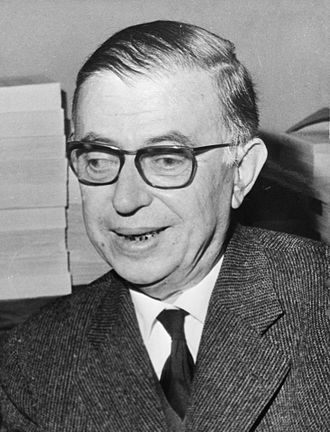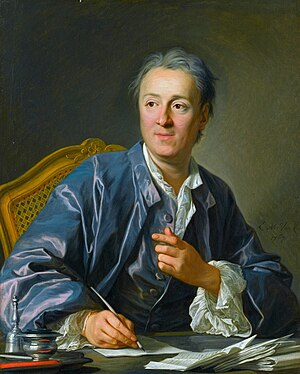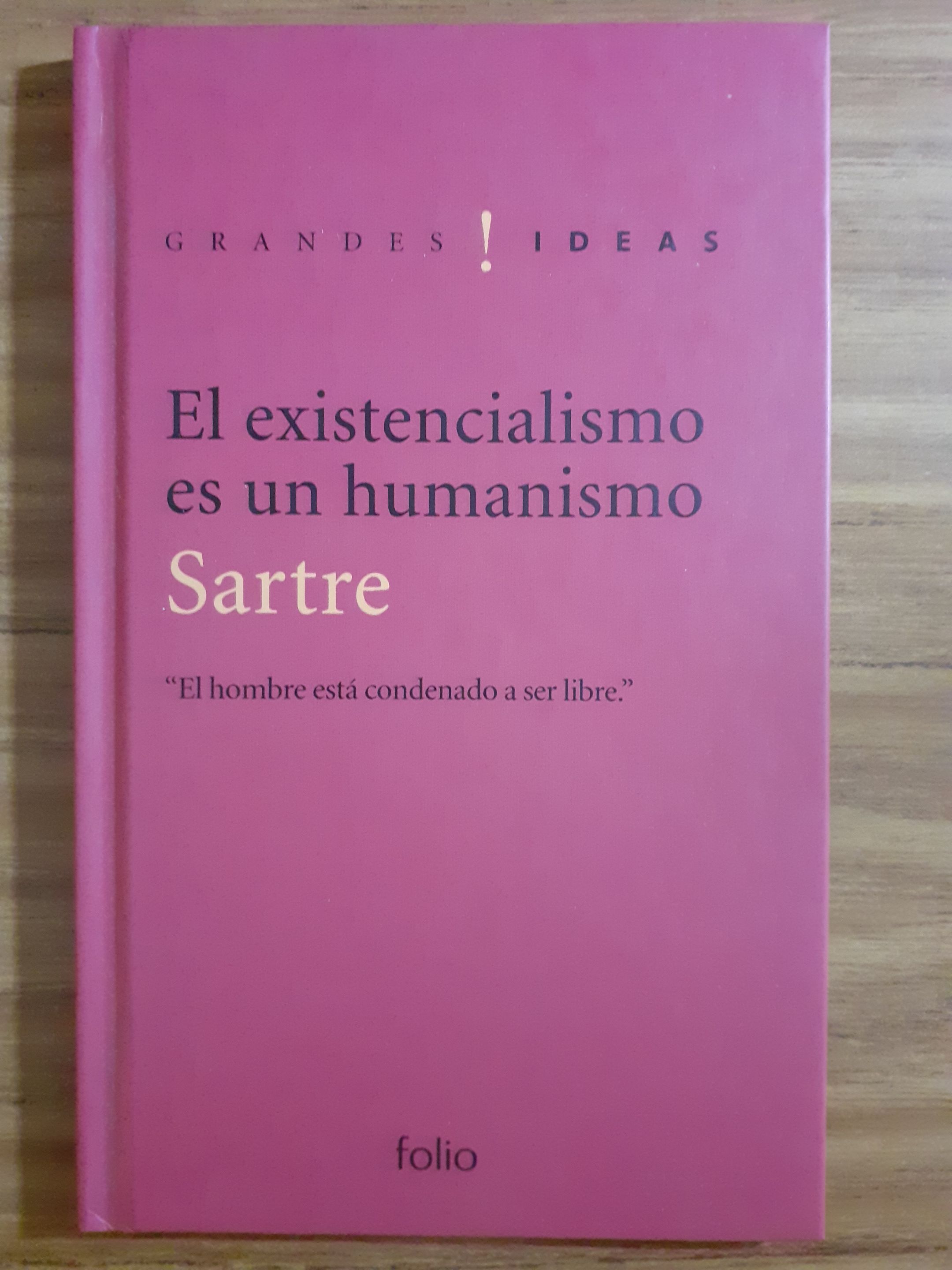This work is a lecture delivered in October 1945, a month after the end of World War II. It is primarily a response to objections raised by communists and Christians who claimed that existentialism leads to quietism, abandons objectivity, focuses on humanity's flaws while dismissing its virtues, and suggests that, without God, anyone can do as they please.

Sartre defines existentialism as [p10] "a doctrine that makes human life possible and, on the other hand, affirms that all truth and all action involve a context and a human subjectivity." However, he notes that [p12] "the word has today taken on such breadth and scope that it no longer means anything at all." This reflects the problem I encountered when searching for the meaning of existentialism or seeing it used in different contexts—I couldn't discern what was and wasn’t existentialism.
Sartre distinguishes between two types of existentialism: Christian and atheistic. He states that what they have in common is that [p12] "they consider that existence precedes essence, or, if preferred, that one must start from subjectivity."
In this text, there are principles and propositions but no explicit system; one must extract it or perhaps even create it, as the author may not have realized all the implications or principles embedded in his writing.
That said, I found the text filled with non-fundamental axiomatic assertions and non sequiturs. Let us delve into this.
Sartre uses the term "humanism" to denote that man is his own legislator. Humanism, according to him, is a consequence of atheism. More importantly, Sartre asserts that even if definitive proof of God's existence were found, man would still need to find and save himself. He frames this in an optimistic light, as humanism is a moral doctrine of action and commitment.
In my view, the debate over whether essence precedes existence or vice versa is resolved with the term "characteristics": there is no existence without characteristics or properties from the very moment it comes into being. Existence and characteristics cannot be separated. The first characteristic of existence is existence itself, defined in opposition not only to non-existence but also to all that it is not (all the characteristics it lacks). This evokes the notions of Being and Non-Being discussed by Heraclitus and Parmenides. For all existing things, having characteristics or properties is intrinsic because each distinguishable entity is so by virtue of differing characteristics. Thus, if we distinguish such a thing as a human, we do so because it possesses something essentially distinct from other primates.

Sartre misunderstands the concept of human nature as postulated by thinkers like Diderot, Voltaire, and Kant, whom he references. For instance, Diderot leaned toward a materialistic view of human nature, understanding human beings as products of natural and material processes. He rejected supernatural explanations, viewing human nature as part of the broader natural continuum. In fact, he considered human nature to be neither fixed nor static but constantly evolving due to interactions with the environment, education, and social conditions.
This view of human nature refers to naturalism: humans are part of nature, just as dolphins are. What is denied is that human essence exists in a Platonic world of ideas of which we are incarnations or instances, or that this essence existed in the mind of a Creator God before divine creation. Sartre's way of describing existentialism and denying the existence of human nature is inconsistent with the existence of uniquely human capabilities, as well as capacities animals possess that humans do not.
Specifically, Sartre says of the atheistic existentialism he represents:
[p14] If God does not exist, there is at least one being in whom existence precedes essence, a being that exists before being defined by any concept, and this being is man—or, as Heidegger says, human reality. What does it mean here that existence precedes essence? It means that man begins by existing, encounters himself, emerges in the world, and only afterward defines himself. Man, as the existentialist conceives him, is not definable because he begins as nothing. He will only become something later, and he will be what he makes of himself. Thus, there is no human nature because there is no God to conceive it. Man is nothing other than what he makes of himself. This is the first principle of existentialism. It is also what is called subjectivity.
This implicitly postulates that humans are a tabula rasa. If Sartre is merely denying a mystical human nature, fine, but he fails to distinguish between the physical and the mystical. At one point, critiquing philosophical materialism that reduces all beings to objects, Sartre says:
[p31] "We want to establish the human realm precisely as a set of values distinct from the material realm."
To me, this ventures into mysticism despite Sartre's atheism, as he attributes supernatural properties to humanity by denying materialism. If he acknowledged culture within materialism, that would be one thing, but by rejecting materialism, he introduces an extra element to the human realm. Where does this "something extra" originate?

Sartre argues that “[p20] man is condemned to be free,” and this may be the appeal of his propositions (though also their rejection). He claims that man chooses who he is, is entirely responsible for himself, and, moreover, that since no one chooses evil but rather good, by choosing to be a specific way, one is also valuing that way over others and proposing it as the optimal way for all men to be.
I believe this only makes sense if universal ethical rules are proposed. I don’t think Sartre means that when someone chooses a job or occupation, they are declaring it definitively superior to any other; such an interpretation would ignore the particular constraints each person faces. Furthermore, this contradicts the pragmatism of ethics and morals: these are not for a solitary Robinson Crusoe but for the duo of Crusoe and Friday, for human relationships. This is why variability exists, as ethics and morals are pragmatically crafted rules for coexistence. Sartre’s assertion also overlooks the possible neutrality or equivalence of certain ethical-moral choices, wherein a decision may simply hinge on pragmatic preference rather than moral considerations. This is why I find it an erroneous derivation when he claims that if someone marries, they are also putting all of humanity on the path to monogamy. No—if I marry, while acknowledging that my choice may influence others’ decisions, it does not mean I believe marriage is the best option for everyone. Such a stance would be an epistemic arrogance, presuming to know whether marriage is good or bad for others.
From this, or at least partially erroneous, conception of total responsibility not just for oneself but for humanity as a whole, the Sartrean existentialist feels anguish: the weight of this universal responsibility. Sartre asserts that those who deny it, resorting to excuses of overpowering passions or determinism, act in “bad faith,” another key concept in this text. He writes:
“[p18] Every man must say to himself: ‘Am I the one entitled to act in such a way that humanity conforms to my actions?’ And if he does not say this, it is because he is masking his anguish.”
He equates this universal anguish to that of a military commander who must decide to send a group of people to certain death to win a war. However, I believe it is a mistake to equate them, as the former anguish is universal —Kantian, one might say, although he rejects kantianism— while the latter could occur even if the commander is certain and convinced they are doing the right thing, but cannot avoid anguish due to empathy for those they send to die or the mere fact of being at war, where such decisions must be made.
One of the best parts of the text is the story Sartre tells about a student who visits him during World War II to ask for advice on whether to stay and care for his mother or go fight to avenge his brother killed by the Germans. Sartre refuses to give advice, arguing that the student has already chosen what he wants to hear by coming to him, thus avoiding taking full responsibility for the decision he wants to make. Sartre concludes that, comparing morality to the construction of a work of art, no ethical system could dictate what the student should do, and he had to invent his own law.
Finally, in the last pages, Sartre states that there are two meanings of humanism. One considers humans as the ultimate end and highest value, which he rejects because humans are not an end but something to be realized, and because no concrete humanity exists to be worshiped in the manner of Auguste Comte. The second, which he approves of, is what he calls existentialist humanism: the idea that the only existing universe is that of human subjectivity, where each person is their own legislator, seeking their goals outside themselves by projecting himself into the world.
Translated from Spanish with chatgpt